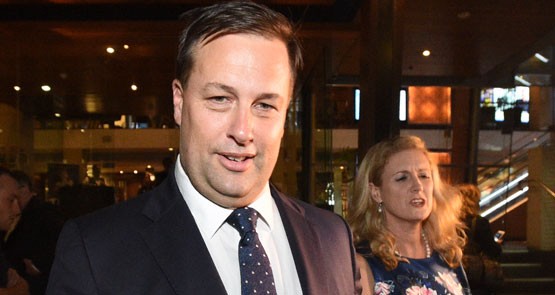
Jason Falinski leaves the Liberal Party preselection meeting on Saturday night
The 91 delegates to the Mackellar preselection met on Saturday afternoon at 3pm for more than five hours of speeches, Q&As and ballots to determine the Liberal candidate for the seat of Mackellar. The venue was the third level of the Dee Why RSL club on Pittwater Road on Sydney’s northern beaches — a modern concrete-and-glass temple to pokies open 24 hours a day. An Adele tribute show was playing in the auditorium opposite. Such was the interest in the future of the sitting member, 73-year-old backbencher Bronwyn Bishop, the streets outside were lined with outside-broadcasting units representing all the TV stations, and reporters galore lined the forecourt and even occupied a table at the bottom of the escalators to level three, where they could watch the ballot boxes moving to and fro.
The media is reporting four ballots, but the first vote was actually the usual ballot as to whether the meeting should proceed to a vote. This was answered in the affirmative. There were a total of seven candidates in the field, and in that first ballot three candidates received zero votes, with another, Alan Jones’ favourite and former Wallaby Bill Calcraft, receiving two. As is the case in exhaustive ballots, those with no votes were immediately eliminated and the candidate with the lowest vote, Calcraft, was also eliminated. Tony Abbott’s fave, far-right Walter Villatora, received 12 votes, Bronwyn Bishop 37 and Jason Falinski 40.
On the second ballot saw Villatora lost three votes, with Bishop picking up two and Falinski three. Such is the far right’s hostility to Bishop it is likely Villatora’s votes leaked to Falinski and Calcraft’s to Bishop. At this stage Villatora was eliminated and, curiously, Twitter was buzzing with reports of a Falinski win. As has been well reported, the third and final ballot culminated in Bronwyn Bishop being ditched in favour of Jason Falinski by 51 to 39, with all the Villatora votes, bar one abstention, going to the moderate-aligned Falinski. After the candidates were led back into the room and the result was announced, Falinski gave a gracious speech thanking all and sundry as well as paying homage to Bishop’s contribution as member. Curiously, when Bishop was given the opportunity to speak as the retiring member, she told the assembly she was privileged to have represented the electorate but was unable to bring herself to mention her replacement by name and could only refer to him as “the winner”.
Now some, uninformed, people will call this a victory by the moderate faction over the right, but they would be wrong. As pointed out in Crikey on March 9, Mackellar is not a factionalised electorate. The dominant soft right/moderate alliance was happy to see Bishop re-endorsed as the candidate, and it was only the far right determined to oust her as a turncoat for voting against Tony Abbott. An alliance of federal parliamentary interests combined with local campaigners to force that comfortable deal to be scuppered — especially after the results of a poll leaked to News Corp showed the seat would be lost to Dick Smith should Bishop be the endorsed candidate.
All in all, the Mackellar preselection represented a rejection of factional politics in favour of real politics. The majority of federal MPs will be pleased with the result, as is the Prime Minister.







The terrorists must be rejoicing now that Bishop is no longer able to fight them.